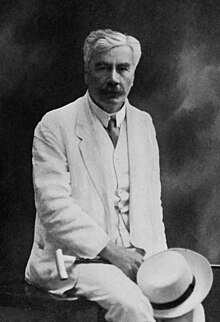Marc Armand Ruffer
Sir Marc Armand Ruffer (* 1859 in Lyon , † April 15, 1917 in the Aegais / Greece northeast of Milos on a sea voyage from Thessaloniki to Egypt ) was a French-English bacteriologist , pathologist and hygienist. He is considered the founder of paleopathology and was knighted for his successful fight against cholera and other infectious diseases.
Life
Ruffer was born in Lyon in 1859 as the son of a Lyon banking dynasty . His mother was German and his father was the respected Baron Jaques de Ruffer . They had their son trained in Germany, France and England. He graduated in arts from Oxford and studied medicine in London. He then worked as a bacteriologist and pathologist and worked for a short time with Louis Pasteur at the institute of the same name .
From 1891 he was the first director of the British Institute of Preventive Medicine , now the Lister Institute of Preventive Medicine ; he was thus Joseph Lister's direct predecessor. During his investigations into diphtheria , which was life-threatening at the time , Ruffer became infected with the pathogen. Because of the nerve paralysis that this triggered, he had to give up this post.
He then went to Cairo in the warm North African climate with the aim of recovery . Shortly after his arrival, he received the chair of bacteriology at the Cairo Medical School and became a globally recognized bacteriologist and hygienist. In Cairo, he was one of the first doctors to systematically examine the remains of mummies and skeletons and found findings of arteriosclerosis , pneumonia and tuberculosis , among other things . He achieved this by developing an efficient and gentle method of rehydrating cell tissue removed from mummies , which still existed in the 1960s, making him a pioneer in paleopathology. Among other things, he discovered that schistosomiasis was widespread in Egypt 3,000 years ago, thus establishing paleoparasitology .
He took over the chairmanship of the Egyptian Council for "Hygiene, Sea and Quarantine", with which he succeeded in the eradication of cholera in Egypt, which, together with his other merits, was the reason for the knight bachelor's knighthood in July 1916 by the British crown. He also worked on the Indian Disease Commission and became the leader of the Egyptian Red Cross with the outbreak of World War I.
Another great success of Ruffer was the direct detection of traces of tuberculosis in the soft tissue of Egyptian mummies of the 21st Dynasty. The presumption that the ancient Egyptian population suffered from tuberculosis could only be confirmed by indirect evidence and the result was questioned by colleagues.
He examined a total of thousands of mummies and published the results from 1917. Among other things, he examined 253 skeletons of Alemanni from the 6th to 8th centuries from southwest Germany and summarized the results in his 1918 article “Arthritis deformans and spondylitis in ancient Egypt " together.
Marc Armand Ruffer was killed in April 1917 by sea from Saloniki , where he was to reorganize the health service of the Greek government, when the British ship Arcadian was sunk by a German submarine. Four years after his death, his collected scientific articles were published under the title "Studies in the Palaeopathalogy of Egypt". These are still considered to be the standard work in paleopathology.
Works (excerpt)
- Arthritis deformans and spondylitis in ancient Egypt . 1918.
- Studies in the Palaeopathology of Egypt. Edited by RL Moodie, Chicago 1921.
- Note on the presence of "Bilharzia haematobia" in egyptian mummies of the twentieth dynasty [1250-1000 BC] , British Medical Journal , Jan. 1910, Vol. 1, No. 2557, p. 16, doi : 10.1136 / bmj.1.2557 .16-a
literature
- Lexicon of natural scientists . Directmedia, Berlin 2005, ISBN 3-89853-485-5 .
- Christoph Gradmann : Ruffer, Marc Armand. In: Werner E. Gerabek , Bernhard D. Haage, Gundolf Keil , Wolfgang Wegner (eds.): Enzyklopädie Medizingeschichte. De Gruyter, Berlin / New York 2005, ISBN 3-11-015714-4 , p. 1274.
Web links
- "Paleopathological Findings of the Spine in the Early Middle Ages: Degenerative changes not more common than today", Deutsches Ärzteblatt 101, Issue 17 (from April 23, 2004)
- Disinfacts, Special "Hygiene and Skin" (PDF file; 878 kB)
Individual evidence
- ^ The University of Glasgow Story : Lieutenant Ronald Stewart .
- ^ RR Landes, St. Hall: A Letter from Louis Pasteur to Marc Armand Ruffer. In: Journal of the History of Medicine. Volume 39, 1984, pp. 356-362.
- ^ AT Sandison: Sir Marc Armand Ruffer (1859-1917). Pioneer of Palaeopathology. In: Med. Hist. Volume 11, 1967, pp. 150-156.
| personal data | |
|---|---|
| SURNAME | Ruffer, Marc Armand |
| BRIEF DESCRIPTION | English bacteriologist and paleopathologist |
| DATE OF BIRTH | 1859 |
| PLACE OF BIRTH | Lyon |
| DATE OF DEATH | April 15, 1917 |
| Place of death | Aegean Sea |
